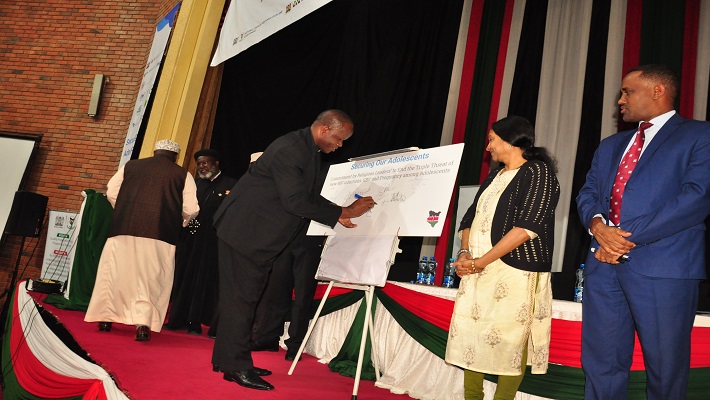By Arnold Neliba
NAIROBI, JULY 28, 2023 (CISA)-Religious leaders in Kenya have today committed to completing the development of a Human Sexuality Training Framework and advocate for its integration in the school curriculum.
“We will reanimate the partnership with the Kenya Institute for Curriculum Development to finalize the development of Human Sexuality Framework and Curriculum premised on the desire to secure our adolescents. Thereafter, we will advocate for the framework to be integrated in the education system curriculum, and especially capacity building of teachers and parents to deliver the same,” reads a July 28 statement jointly signed at the end of a religious Leaders Conference on Ending the Triple Threat of New HIV Infections, High Rate of Sexual and Gender Based Violence, and Pregnancies among Adolescents.
The conference held at Ufungamano House in Nairobi was convened by the Government of Kenya and United Nations in collaboration with faith bodies in Kenya.
“…we have to come together around common goals of ending a threat. Despite the diversity of our background and the multiplicity and diversity of our believes and approaches, when it comes to something as sensitive and ending a threat, it necessarily means bringing together different actors with different perspectives and different norms,” Dr Stephen Jackson the United Nations Resident Coordinator told the religious leaders.
“We may not always converge on mechanisms, we may have different beliefs about how to get from A to B, what is important is that we agree on the destination,” he stressed.
In his address, James Muhati, the Permanent Secretary State Department for Economic planning revealed that a training manual and a handbook for the national government and administration officers on triple threats has been developed and training of trainers has been undertaken.
“Today is a new dawn when we have really yet another key stakeholder on board in this triple threat campaign and these are the religious leaders… who play a very important role in shaping the moral fabric and values of the society. You hold influential strategic platforms that can impact behavior change of the adolescents,” he said. The religious leaders representing several faith groups on appended their signatures to the agreement committing to transforming social attitudes to secure and empower adolescents by developing and delivering coordinated messages and sermons addressing the causes of the threats.
“We will develop the capacities of clergy, congregational leaders, chaplains, youth leaders and Sunday school and Madrassa teachers to deliver the messages and drive social attitude transformation,” the leaders said in the statement read by Rev Chris Kinyanjui, Secretary General of National Council of Churches of Kenya (NCCK). Present were representatives from Evangelical Alliance of Kenya, Hindu Council of Kenya, Inter Religious of Kenya, Kenya Conference of Catholic Bishops, National Muslim Leaders Forum, Organisation of African Instituted Churches, Seventh Day Adventists, Shia Asna Ashri Jamaat and Supreme Council of Kenya Muslims.
Further on stigma and reintegration of girl and boy survivors in education institutions, the leaders pledged to, “…synchronize life skills and Rites of passage training materials by different institutions to develop a common one that is comprehensive and relevant to our cultural and religious settings. We will also work with teachers and chaplains to create safe spaces for adolescent survivors of triple threats.”
For survivors who drop out of school, they promised to ensure delivery of livelihoods skills and champion for re-admission of adolescents back to school.
Kenya is seeking to improve health of adolescents, ages 10-19, who face a high risk of new HIV 99 new infections per week according to 2021 data. 15 percent of girls aged 15-19 years have started motherhood according to 2022 data and 7 percent of adolescents both male and female have experienced sexual violence constituting 42.4 percent of reported cases.
